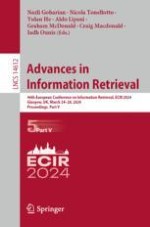The six-volume set LNCS 14608, 14609, 14609, 14610, 14611, 14612 and 14613 constitutes the refereed proceedings of the 46th European Conference on IR Research, ECIR 2024, held in Glasgow, UK, during March 24–28, 2024.
The 57 full papers, 18 finding papers, 36 short papers, 26 IR4Good papers, 18 demonstration papers, 9 reproducibility papers, 8 doctoral consortium papers, and 15 invited CLEF papers were carefully reviewed and selected from 578 submissions. The accepted papers cover the state of the art in information retrieval focusing on user aspects, system and foundational aspects, machine learning, applications, evaluation, new social and technical challenges, and other topics of direct or indirect relevance to search.
